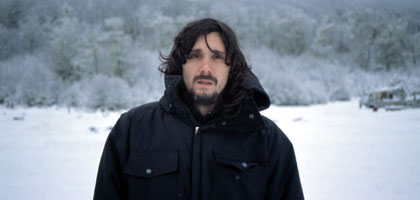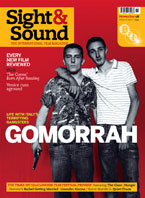The London Film Festival: Liverpool - Interview

Maria Delgado: After finishing your third film 'Fantasma' you said you were closing a door and opening another with 'Liverpool'. What new direction does 'Liverpool' signify?
Lisandro Alonso: I'm not sure if I opened a different door with Liverpool, but I did try out new things and met new people. With La libertad, Los muertos, and Fantasma I brought together a team of people - the non-actors who act in the films - and developed certain relationships with them. When we finished Fantasma, I decided to find other people, places and environments. This is probably the door that Liverpool opened up for me. There's a different landscape in the film - it's colder, more frozen - and there's a greater concentration on interiors.
MD: One significant difference in 'Liverpool' is that you worked with a co-screenwriter, Salvador Roselli. You've talked about the script as a guide for structuring scenes before the shoot. How does that change with a co-writer?
LA: The screenplay for Liverpool wasn't conventional, although it's certainly the longest I've written. It was only 24 pages, and more of a process of defining the different spaces and characters. Salvador didn't really contribute to the creative vision, but he did help me focus on what I wanted to capture. We started filming in the middle of the ocean, then continued in a really windy port [Ushuaia] and concluded in a remote location where the temperature was minus 12. On a good day we only had five hours of daylight, so I didn't have much time to try things out. That's why the screenplay had to be more robust.
MD: Your films share an emphasis on painting with a particular colour.
LA: I'm not sure I'm doing that consciously. The landscape and environment tend to define the palette. In Los muertos, green was dominant because it's the colour of the vegetation in that area and reflected on the skin and white shirt of the protagonist. In Liverpool I worked again with Gonzalo Delgado, the art director on Fantasma, and we wanted white to dominate towards the end of the film while red was present throughout. I love red, it's there in all my credit sequences. In Liverpool it contrasts with the snow and conveys a sense of violence. In these isolated, marginalised places, where there is little communication, violence often predominates.
MD: You've said you've "little faith in words" but sound is a palpable presence in your films. Did your work as a sound assistant on Pablo Trapero's films shape your attention to the aural?
LA: Yes, I realised what sound can bring to a film. I'm also aware of what a lack of sound can do. In all my films, except Fantasma, there's realistic sound design, but I also listen to the landscape and decide whether it will accompany the protagonist, whether it's aggressive or passive. In Liverpool the landscape is frozen, almost silent, a very different concept from Los muertos and La libertad, where nature is vibrant. Towards the end of Los muertos the sounds that invade the landscape resonate in the protagonist's head; thoughts he can't rationalize as speech. In Liverpool music creates an energy at the beginning of the film that's gone by the end. My films all have the same sound director, Catriel Vildósola. He has a band called Flormaleva and he knows the kind of music I want. I really like Flormaleva's music so I used it during the credits.
MD: Three of your films have been shot away from Buenos Aires: 'La libertad' in the pampas, 'Los muertos' in Corrientes, and 'Liverpool' in Tierra del Fuego and the area around Argentina's southernmost city, Ushuaia.
LA: My films come from strange places. I can be looking at a magazine, watching television or reading a book and I find a space. When that's defined, I locate two or three images in that space and with them I begin to shape the film. The images may be blurred, but I take them with me when I travel to the location. I explore it and see who comes into the images and what might happen there. I stay for a week or two with a sleeping bag and try to delineate the guide, or screenplay, that will be further refined. It's about trying to find the people I don't see every day in the city or on television or in the newspapers. Making a film is an excuse to live with them for four or five weeks. Spending time with them makes me a better person.
MD: Is this why you use non-professional actors?
LA: I really respect professional actors and at some point I may conceive a project where I can work with them, but I'm not there yet. I also don't see myself mixing professionals and non-professionals: it wouldn't gel with my way of working. I'm still learning about the process of making a film and working with non-professional actors is part of that process.
MD: What defines your work?
LA: I'm not interested in judging characters. That's one reason why I don't dwell on backstories. If you play with psychological reasoning you fall into the trap of judging what people do. I am more interested in asking questions of the characters and the audience - I'm not interested in answers. If a day comes when I have the answers I won't bother making films any more.
MD: Where did the title 'Liverpool' come from?
LA: When I was working on the post-production of Fantasma in Chile I saw a Beatles cover band called The Sounds of Liverpool. In the venue there was a young woman with a learning disability begging for money. The image of these things came together and just wouldn't go away. From there I began to think about Liverpool as a port city and then about port cities in Argentina and that's how I came to Ushuaia, which has a long history of English immigrants. Film-making is about these elusive links.


